Conservationists pass nine resolutions, recognize those among them for extraordinary work at 85th MUCC Annual Convention
Conservationists passed nine resolutions, improved habitat and public access and recognized those among them for their extraordinary work June 24 and 25 at the 85th MUCC Annual Convention.
Michigan United Conservation Clubs (MUCC) called its meeting to order with the Conservation Pledge, written in 1937 after the adjournment of the first MUCC meeting by legendary writer Ben East:
“ I give my pledge as an American to save and faithfully defend from waste the natural resources of my country – its air, soil, and minerals, its forests, waters, and wildlife.”
The weekend started Friday with an On the Ground project in the Rose Lake State Wildlife Area. Volunteers combined for a total of 30 hours and improved a half-acre of habitat, including 350 meters of access trail and boardwalk.
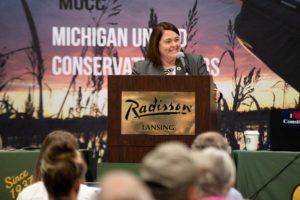
MUCC Executive Director, Amy Trotter, addresses delegates during MUCC’s convention on June 25, 2022.
“Seeing everyone come together Friday evening to celebrate our history and our past accomplishments proves just how strong the mission of conservation in Michigan is,” Trotter said. “Watching the camaraderie Friday transition to healthy debate surrounding resolutions Saturday is what makes our grassroots process special.”
Saturday Business
In total, 10 resolutions were brought to the floor on Saturday , including affirmation of MUCC’s commitment to Proposal G of 1996 and recognition of the proposed Enbridge Line 5 tunnel as the best viable alternative right now. One resolution failed.
Resolution #10, which passed unanimously, reaffirms MUCC commitment to Proposal G: That “MUCC take action to ensure Proposal G’s original intent is upheld.”

Convetion delegates vote on a resolution at the 2022 MUCC Annual Convention.
This resolution speaks to the foundation of our organization, said Trotter, and comes on the heels of the DNR attempting to separate authorities in orders considered by the Natural Resources Commission.
“MUCC members solidified the organization’s stance that a seven-member, bipartisan body is the best tool for deciding wildlife and natural resources management decisions,” Trotter said. “The department’s review of the authorities under Proposal G is concerning for the conservation community and all that have worked so hard to ensure our natural resources do not become a political football. MUCC is committed to eliminating any legal uncertainties in a collaborative way forward.”
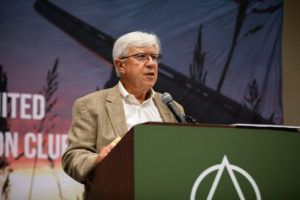
Natural Resources Commission Chair Tom Baird gives the keynote speech during the MUCC Annual Convention.
DNR Director Dan Eichinger and NRC Chair Tom Baird spoke at the convention luncheon.
Baird focused his speech on the challenges that lie ahead, such as sandhill crane management, wolves and managing for diverse species and users. He noted the need for MUCC to work with organizations like the Humane Society of the United States.
Eichinger focused on the department’s relationship with MUCC, noting that while it is sometimes rightfully strained, the two organizations have undoubtedly made Michigan a better place to hunt, fish and trap.
“Our organizations have always been able to work together in the same space and approach issues from unique and different perspectives,” Eichinger said.
Arguably the most debated topic, Resolution #2 pertaining to the Line 5 tunnel, was submitted by MUCC Past President George Lindquist. The resolution directs MUCC to accept the proposed Enbridge tunnel as the best alternative and to urge the state and contractors to move the project forward.
A 2018 resolution made it MUCC policy to consider possible alternatives to replace the existing Line 5 tunnel.
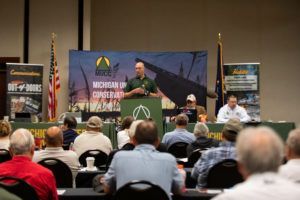
DNR Director Dan Eichinger speaks in front of the MUCC convention delegation and staff.
Originally drafted in 2021, this resolution urges MUCC to support a plan where: “the state requires Enbridge to be responsible financially for the construction and operation of the tunnel holding the state harmless, that Enbridge provides the State with financial assurances (not including self-insurance) that would cover cleanup of a catastrophic release to the Straits and that the company submits an acceptable monitoring plan.”
Lindquist said this is an essential infrastructure project.
“To move away from the tunnel plan without an equal level of green energy sources ready and available would be irresponsible,” Lindquist said. “This is an essential infrastructure project that Michigan citizens need.”
The National Wildlife Federation (NWF), which MUCC is a state affiliate of, offered an amendment that would require Enbridge to meet certain requirements before triggering MUCC’s support. The amendment failed.
Conservation Awards Banquet
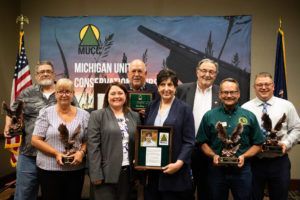
MUCC Award winners from left to right: Roger Calhoun accepting the award on behalf of the Livingston County Wildlife and Conservation Club, Sue Pride, Amy Trotter, Stever Sharp, Becky Humphries, Jim Hammill, Bruce Barlow and Justin Lazar.
MUCC inducted Becky Humphries into the Conservation Hall of Fame at its annual awards banquet. Jim Hammill was also recognized for 50 years of service to conservation and the Sue Pride Unsung Hero Award was renamed and presented to Sue Pride for her selfless years of dedication and service to MUCC as a 40-year staff member.
Elections of Officers
On Sunday, MUCC elected longtime Wildlife Committee Chair Rob Miller to the vice presidency as Tim Muir ascended to the presidency of the Executive Board. Immediate Past President George Lindquist moved off the MUCC Executive Board and new Immediate Past President Greg Peter assumed the seat.
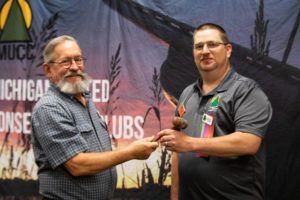
Immediate Past President Greg Peter passes the gavel to President Tim Muir.
Peter served the organization through COVID and some of its most uncertain times, Muir said.
“We are all lucky to have had Greg’s thoughtful and practical leadership skills guiding our organization during uncertain times,” Muir said. “We look forward to his continued service on our board and for him to recenter his focus within the board on those interests he is most passionate about like bridging the gap between consumptive and non-consumptive outdoor recreationists through the common ground like combating invasive species.”
Regions 2 through 8 election results are as follows:
Executive Board
Region 2: Steve Dey
Region 4: Luke Sitton
Region 6: Dan McMaster
Region 8: Leonard Shaner
At Large Director: Eric Braden
Conservation Policy Board
Region 2: Gary Gorniak, Mark Spencer, Robert G. Warner
Region 4: Pete Demos, Joe Heberling,
Region 6: Wayne Hanson, Anthony Mitchell, Bruce Levey
Region 8: Rick Okerhjelm, Taylor Renton, Roger Calhoun
Individual members nominated for appointments: Kelly Ross (Region 4) and Zach Snyder (Region 8)
Recent Posts



